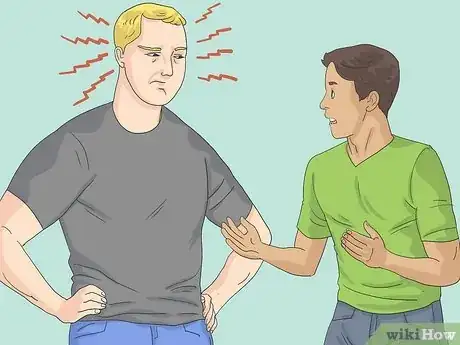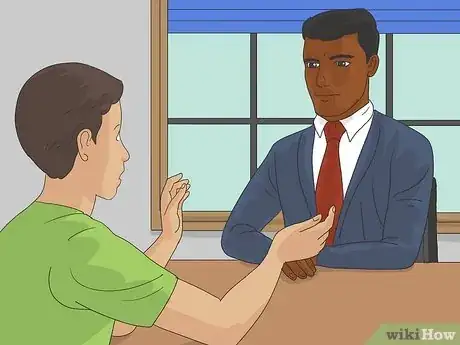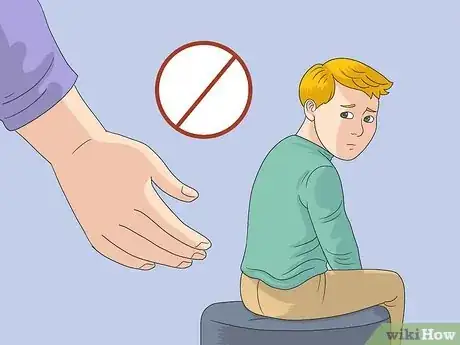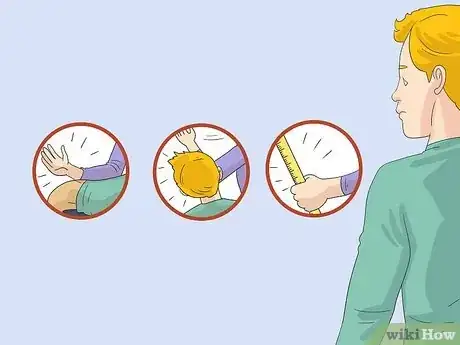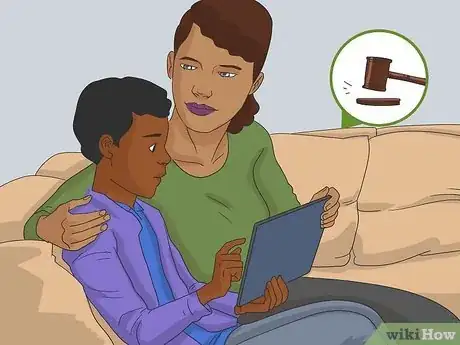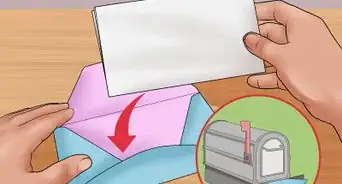This article was co-authored by Clinton M. Sandvick, JD, PhD. Clinton M. Sandvick worked as a civil litigator in California for over 7 years. He received his JD from the University of Wisconsin-Madison in 1998 and his PhD in American History from the University of Oregon in 2013.
There are 15 references cited in this article, which can be found at the bottom of the page.
This article has been viewed 37,319 times.
Corporal punishment is often defined as the use of physical force causing pain, but not wounds, as a means of discipline. Most often, corporal punishment involves an adult causing pain, through physical touching, to a minor. The adult is generally a parent, teacher, or other person with authority over the minor. If you believe you are being subjected to corporal punishment and you have identified it as such, you can deal with it by proposing alternatives, contacting the police, or filing a lawsuit. Each method of dealing with corporal punishment has its' advantages and drawbacks, so choose the method that best fits your needs.
Steps
Preventing Corporal Punishment Using Alternatives
-
1Learn anger management techniques. If you are the victim of corporal punishment, talk to the adult about using anger management techniques to cool down as opposed to physically touching you. Tell them they can count to ten, take deep breaths, or remove yourself from the room.[1]
-
2Set clear rules in advance. Talk with your parents or teachers ahead of time about your boundaries and so you know what is expected of you. If you know what is expected of you, you will know how to avoid getting punished.[2] In addition, if you set boundaries with the adults in your life, hopefully they will respect them.Advertisement
-
3Use positive reinforcement. Ask your parents and teachers to use positive reinforcement as opposed to using physical punishment.[3] Tell them you respond better when you are praised and told what you are doing well.
-
4Apply logical consequences.[4] Tell your parents and teachers that your punishments should fit the crimes. For example, if you skipped school, maybe your parents require that you spend extra time at school for a week or that you do some extra homework.
-
5Attend family counseling. If all else fails, tell your parents you want to go to counseling. Counseling can be a great and safe way to talk with your family about your concerns. Counselors are trained to listen to your concerns and convey them to your parents. Your family and your counselors will then work on solutions. For example, a counselor may tell your parents alternative ways to punish you and the counselor may talk to you about obeying and respecting your parents.
- You can find counselors through a social worker, public health departments, social services, or your school.[5]
-
6Apologize for your actions. If you have been a part of a single instance of minor corporal punishment (e.g., a single spanking), you may want to apologize for your actions and talk with the punisher about what happened. This will hopefully alleviate the problem in the future and will allow both parties to move on.
- While you should apologize if you did something wrong that led to the punishment, and the punishment was minor, you should never apologize for being the victim of abuse. If any punishment rises to the level of abuse, you need to have a more serious conversation.
-
7Ask for a different punishment. Another way to move on quickly from minor instances of corporal punishment is to talk with the other party about other ways to get their point across. You may want to discuss time-outs or taking away privileges as an alternative to physical punishment.
- However, if the physical punishment continues even after having this discussion, you may need to take more serious steps to stop the corporal punishment.
Identifying Corporal Punishment
-
1Check your state's laws. Every state in the United States allows some level of corporal punishment. However, some states limit who can inflict corporal punishment and where it can be inflicted. Check with your state laws to determine the extent someone is allowed to physically punish you. For example:
- Corporal punishment is allowed, to a degree, in every state for parents disciplining their children in the home.
- No federal law prohibits corporal punishment in schools. However, 31 states prohibit corporal punishment in public schools. For example, Iowa explicitly bans the practice in all private and public school settings. However, Florida, for example, allows teachers to use corporal punishment so long as they follow certain policies.[6]
- Some states only allow certain individuals to use corporal punishment. In Texas, only parents, grandparents, stepparents, and guardians can use the tactic.[7]
-
2Understand corporal punishment's limits. Even though corporal punishment may be allowed in certain circumstances, every law has limits. Be sure you understand whether an adult's actions toward you cross a line between corporal punishment and abuse. Also, even though an adult's actions towards you may not cross a legal line, it does not make those actions right.
- For example, in Massachusetts, a parent can be held criminally liable if the force used against you is unreasonable; if the force causes physical harm, gross degradation, or severe mental distress; or if the force used is not reasonably related to your punishment.
- In Florida, a teacher can be punished if they use corporal punishment without it being in the presence of another adult who has been informed of the reason behind the punishment.[8]
-
3Look for common actions. If you are unsure whether you are the victim of corporal punishment, consider if you have been on the receiving end of any of the following actions (or similar actions):
- Spankings;
- Slaps; and
- Being hit with a ruler or other tool;
-
4Think about the effects on children. You can also identify corporal punishment by the effect it has on you. If you are not sure whether some form of physical punishment could be considered corporal punishment, consider if you have been effected in any of the following manners:
- Lowering of your self-esteem;
- Interference with your learning processes
- Feelings of loneliness, sadness, and abandonment;
- Thoughts of violence; or
- Difficulties being social.
-
5Consider how corporal punishment affects parents. If you are a parent, handing out corporal punishment can have negative effects on you as well. If you are not sure whether your form of punishment may be considered corporal punishment, think about how you feel when you hand out punishment.
- Corporal punishment can make you feel anxious and guilty.
- Taking part in corporal punishment can make you act violently in other settings.
- Corporal punishment can stifle your relationship with your child.
Reporting Abuse
-
1Contact the police. If you are in immediate danger and the physical harm is becoming abusive, call 9-1-1 immediately. If you are not in immediate danger but would like to employ the help of the local police, you can call your local police non-emergency line and talk to the police department about your concerns. When you call the police you will likely be filing a report. When you file a report you document the physical harm and create an official record that can be used in court.
- In some localities you may even be able to file a report online.
- You do not need to be 18 to file a report so do not be afraid to call the police if you need to.[9]
- Unlike going to civil court, creating this sort of report may result in criminal charges being brought. If criminal charges are brought, a prosecutor may bring a case against the offender and it may result in that person being imprisoned for a period of time.
-
2Call your local child protective services. Most states have hotlines you can call to make a report with child protective services. When you call, you will talk to an individual who will ask you some questions about the abuse. Be prepared to tell the person on the other line where you live, what your name is, and how they can get ahold of you. In addition, if you feel comfortable, you should reveal the person who has been abusing you.
-
3Visit a medical center. If you have been physically injured or are bleeding, you need to get to a hospital. If you are able to get yourself there, consider going alone. However, if you are not able to go by yourself, ask another parent to take you or ask a family friend. When you go to the hospital, explain how you were injured and who caused it. This should raise a red flag with the hospital and they may even be required to report the injuries.
Going to Court
-
1Obtain a guardian ad litem. If you are a minor, you cannot bring a civil lawsuit on your own behalf. If you, as a minor, want to bring a lawsuit against someone who has abused you, you will need to have a guardian ad litem appointed by a court. To do so, someone will have to fill out a court form and file it with an appropriate court. A judge will then appoint an appropriate guardian ad litem to represent your interests.
- In California, you would file an Application for Appointment of Guardian Ad Litem (Form CIV-010). You can only fill out this form by yourself if you are over the age of 14. If you are younger than that, someone will have to fill out the form for you. You will need to include information about who you want appointed, what their relationship is to you, and why you are asking to have them appointed.[10]
-
2Find out if your state allows corporal punishment. If your state allows some form of corporal punishment, you will not be able to bring a lawsuit unless the physical harm rises to a level that exceeds that allowed by your state's statute. If your state does not allow corporal punishment in some form or fashion, you may be able to bring an abuse case, or something similar.
- Check with your state laws by going online or visiting your local library. If you go to your local library, the librarians will often be able to help you find what you are looking for.
- Without actually hiring a lawyer, you may be able to talk to one quickly and get an idea of how to proceed. Usually this will be in the form of an initial consultation.
-
3Determine if you have a valid case. Unlike a criminal case, if you are taking an adult to court to recoup money damages, you will need to find a law to sue under. If you believe you have been the victim of physical abuse, you may be able to bring a civil case for the torts of battery, assault, and intentional infliction of emotional distress.
- To make out a claim for battery, you will have to be able to show that someone intentionally caused harmful or offensive contact with your person without your consent.[11]
- To sue on a theory of assault, you must be able to show that someone put you in reasonable apprehension of an imminent harmful or offensive contact.[12] Unlike battery, you do not need to be physically contacted to make out a valid claim for assault. Usually, your guardian ad litem and attorney will bring a case claiming both battery and assault.
- If you want to sue for intentional infliction of emotional distress, you must be able to show that the adult acted intentionally or recklessly, that their conduct was extreme and outrageous, and that their conduct caused you severe emotional distress.[13]
- In California, you may also be able to bring a suit for harassment, which is defined as unlawful violence (i.e., assault or battery).[14]
-
4Hire an attorney. Once you have a guardian ad litem and they think you may have a valid case, you should contact a civil attorney specializing in child abuse cases. Have your guardian ad litem ask their friends and family if they may know of any good lawyers. Your guardian ad litem can also visit your state bar website and use their lawyer referral service. These resources allow you to talk to someone about your issue and they will get you in contact with a qualified attorney.
-
5Draft your complaint and summons. To start, you will need to find a form or create your own complaint. In addition, you will need to draft a summons that notifies the other party that they are being sued.[15] In physical abuse cases, including battery and assault, you will most likely have to create your own complaint. To do so, you will need to use specific pleading paper, which can be found online, and you will have to use the correct font and margins. In the body of your complaint, you will need to include the following information:
- A statement of jurisdiction and venue explaining why you are in the right court;
- A description of the parties;
- A statement of the facts, which will include a detailed description of how and when you were abused;
- The claims you are making (i.e., that you are suing on a theory of battery and assault); and
- A request for relief, which will include asking the court to find in your favor and award a certain amount of money.[16]
-
6File your lawsuit. When your attorney, guardian ad litem, or both have drafted the complaint and summons, you will need to file those papers with the appropriate court. You should choose to file in a state court in the county where the abuse took place or where the defendant resides. When you file your lawsuit, you will be required to pay a filing fee.
- If you cannot afford the filing fee, you may be able to get a fee waiver. Your guardian ad litem will have to show that they do not have the income to pay the fees.
-
7Serve the defendant. After your lawsuit is filed, you will have to have someone unrelated to the case give a copy of your lawsuit to the defendant. This acts to provide notice to the other party that they are being sued. Once the defendant has been served, you or the person providing service will have to file a signed proof of service.
- The most common way of providing service is to have the sheriff's office or another individual over the age of 18 personally give the papers to the defendant.
- You can find proof of service forms online at most state court websites.[17]
-
8Participate in discovery. At the beginning of a lawsuit both parties will have a chance to collect information about the upcoming case. During discovery, you and the other party will exchange information regarding the witnesses and evidence you have. Common forms of discovery include:
- Subpoenas, which is a court order requiring the other side to provide you with certain information. Subpoenas are a powerful tool you may try to use to force someone to answer questions about the punishment you received. Oftentimes, parents or teachers will be unwilling to submit to voluntary questioning and you may need a subpoena to help your cause.
- Depositions, which are in-person interviews of potential witnesses. Depositions will be incredibly important to a case about corporal punishment. You will want to depose parents, teachers, and any other individuals related to the case. This may also include deposing police if they were ever called.
- Interrogatories, which are written questions another party is required to answer. Interrogatories are a great way to get information about abuse if you cannot get the witness deposed. You should ask questions about the type and extent of the punishment, how it was administered, and who administered it.
-
9File a motion for summary judgment. At or near the end of discovery, you may want to consider filing a motion for summary judgment. This motion asks the court to rule in your favor without ever going to trial. To succeed, you will have to show there is no genuine issue of material fact and that you are entitled to a judgment as a matter of law.[18]
- In reality, this means you will have to show the court that all the facts are in your favor and the law is clear. If there is any factual dispute, you will not be granted summary judgment.
- For example, if you sued someone under a theory of battery, you would have to convince the judge that all the facts surrounding your case make it clear that the elements of battery are met. If any questions loom as to who is responsible for the unwanted contact or whether you consented, the case will survive a motion for summary judgment.
-
10Try to settle your case. Depending on the strength of your case and the amount of time your guardian ad litem has, you may want to consider trying to settle your case before it goes to trial. Have your attorney contact the other party (or their attorney) and try to negotiate a settlement. Most defendants in abuse cases will try to settle in order to avoid being seen as liable. In corporal punishment cases, a lot of defendants will settle on the condition that they do not have to admit fault. During negotiations you should:
- Assess the other party's strengths and weaknesses;
- Persuade the other party that you are likely to succeed in court and that it would be advantageous to settle; and
- Bargain with the other party until an acceptable settlement can be reached (or you go to trial).
-
11Attend trial. If you go to trial, each side will present their case and it will be up to a judge or jury to decide who prevails. Each side will submit witness testimony and exhibits. Each side will have an opportunity to question each side's information. At the end of the trial, the jury or judge will deliberate until a conclusion is reached.[19]
- At trial, depending on your age and relationship to the defendant, you may be required to confront them. If this is not something you feel comfortable with because of the abuse you have endured, you need to talk to your attorney about your options.
References
- ↑ http://centerforparentingeducation.org/library-of-articles/discipline-topics/case-corporal-punishment/#tenalternatives
- ↑ http://centerforparentingeducation.org/library-of-articles/discipline-topics/case-corporal-punishment/#tenalternatives
- ↑ https://www.michigan.gov/documents/mde/corporal_punishment_alternatives_193705_7.pdf
- ↑ https://www.michigan.gov/documents/mde/corporal_punishment_alternatives_193705_7.pdf
- ↑ https://www.michigan.gov/documents/mde/corporal_punishment_alternatives_193705_7.pdf
- ↑ http://www.leg.state.fl.us/Statutes/index.cfm?App_mode=Display_Statute&URL=1000-1099/1003/Sections/1003.32.html
- ↑ http://www.statutes.legis.state.tx.us/Docs/FA/htm/FA.151.htm
- ↑ http://www.leg.state.fl.us/Statutes/index.cfm?App_mode=Display_Statute&URL=1000-1099/1003/Sections/1003.32.html
- ↑ http://www.thehotline.org/2014/09/quick-look-police-reports-and-protective-orders/
- ↑ http://www.courts.ca.gov/documents/civ010.pdf
- ↑ https://www.law.cornell.edu/wex/battery
- ↑ https://www.law.cornell.edu/wex/assault
- ↑ https://www.law.cornell.edu/wex/intentional_infliction_of_emotional_distress
- ↑ http://www.courts.ca.gov/1258.htm#ch
- ↑ http://www.courts.ca.gov/documents/sum100.pdf
- ↑ http://www.publiccounsel.org/tools/materials/files/GUIDE-How-to-Write-a-Complaint.pdf
- ↑ http://www.courts.ca.gov/documents/fl330.pdf
- ↑ https://www.law.cornell.edu/rules/frcp/rule_56
- ↑ http://www.courts.ca.gov/1094.htm
